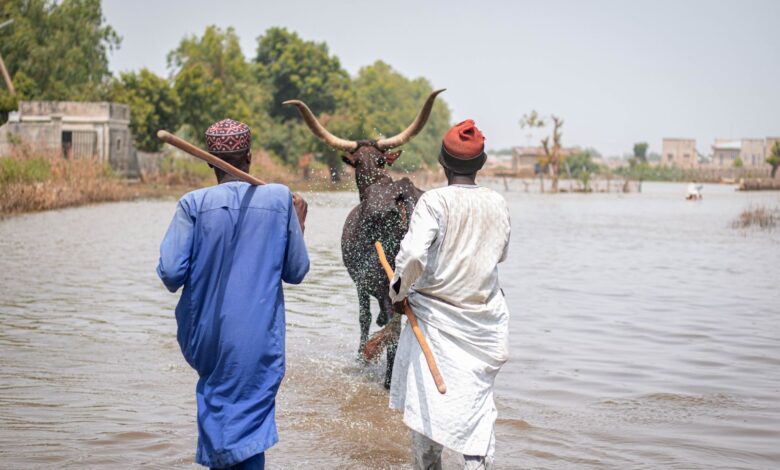Nigeria Listed Among Countries Least Able To Deal With Environmental Disaster
Nigeria has been included in a list of ten countries least able to protect their citizens from severe weather leaving them at the greatest risk of suffering environmental disasters. The list comes just as more torrential rain and flooding are predicted this year.

Nigeria is among the ten countries in the world least able to deal with looming environmental disasters like increased flooding, drought and extreme hot weather, international humanitarian organisations say.
Nigeria joins countries like Somalia, Democratic Republic of Congo, Central African Republic and Yemen, because “political tensions and widespread conflict have contributed to the country’s fragility, making it difficult to respond to climate disasters,” the organisations that drew up the list say.
The most vulnerable people will suffer the most from the country’s inability to respond effectively to meet the challenges of climate change, says the International Rescue Committee, one of the list’s authors.
The ten countries were selected for the new list because they have poor “climate readiness”, the ability to protect citizens from the effects of catastrophic weather.
“The catastrophic consequences of climate change are already here as more frequent and intense natural disasters and extreme weather destroy livelihoods, intensify violent conflict, and force people to flee their homes,” IRC said in a statement.
The IRC and World Resource International created the list by examining the threats that climate change poses to a country and the country’s ability to protect its citizens from it.
The Nigerian government has issued severe warnings there will be more flooding this coming rainy season. Communities are still struggling to recover after torrential rain flooded towns and farmlands in 2022. The flooding left over 600 dead.
The International Rescue Committee and World Resource Institute (WRI) agree many countries are already experiencing the catastrophic outcomes of climate change. Climate shocks are becoming more intense and frequent, they say.
“The world’s most vulnerable populations are already on the frontline of the climate crisis,” said David Miliband, head of the International Rescue Committee.
Other countries listed are Somalia, Yemen, Syria, Democratic Republic of Congo, Afghanistan, Chad, South Sudan, Central African Republic, and Ethiopia.
Climate shocks in Nigeria
Across Nigeria, the flooding disaster that occurred towards the end of 2022 affected some two million people.
This year, it is projected that at least 25 million people in Nigeria will go through high levels of food insecurity as a result of the flooding.
In a recent report, HumAngle spoke to Hassan Gagiyo, a farmer in Gashua community of Yobe state, northeast Nigeria, who lost millions of naira in investments on his farmland due to the flood disaster that hit his community.
“My problems became new,” he said. “Because we were having bumper harvests in our farms before the flood despite the economic hardship, we are getting sustenance from there. But it has reached an extent where there is no grass (kara) to feed livestock, not to even talk of the food we will store until the next season.”
Also during the hot season, Nigerians are at risk of intense heat temperatures that are likely to worsen the occurrence of catastrophic heatwaves and heat-related illnesses.
According to Dr Habiba, a Resident Doctor with the University of Abuja Teaching Hospital, there are bacterial organisms that thrive in the heat, as well as food items, which rot faster during the hot season. This exacerbates diarrheal infections among people living in low-income communities.
The IRC says it advocates for policy changes that reduce greenhouse gas emissions and lessens the impacts of climate change on the world’s vulnerable communities.
The organisation noted that it is conducting research on climate change and is committed to using evidence-based solutions to build climate resilience.
Support Our Journalism
There are millions of ordinary people affected by conflict in Africa whose stories are missing in the mainstream media. HumAngle is determined to tell those challenging and under-reported stories, hoping that the people impacted by these conflicts will find the safety and security they deserve.
To ensure that we continue to provide public service coverage, we have a small favour to ask you. We want you to be part of our journalistic endeavour by contributing a token to us.
Your donation will further promote a robust, free, and independent media.
Donate HereStay Closer To The Stories That Matter




